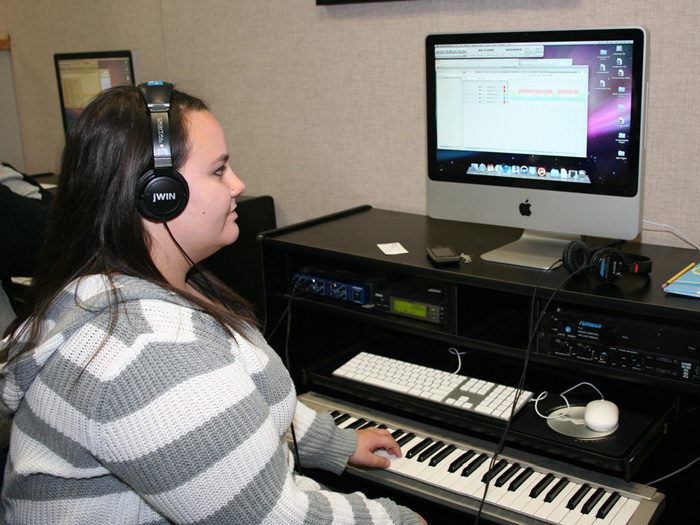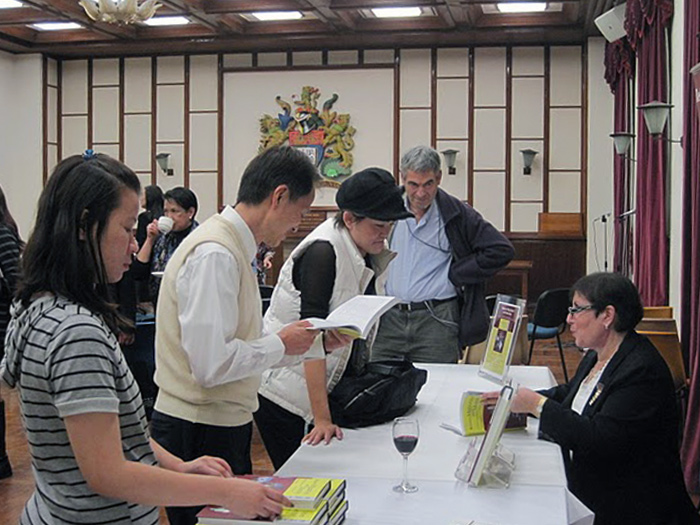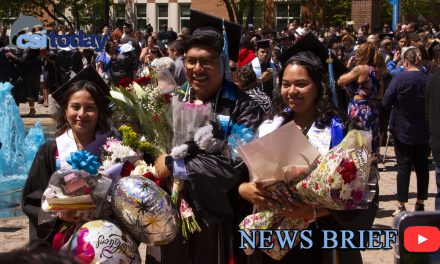The state-of-the-art Music Technology facilities at the College of Staten Island have just received ten new Macintosh computers in an effort to upgrade its facilities to industry-leading technologies as an investment in CSI Music students.
View the Lab in the CSI Today Photo Gallery.
CSI Music student Christina Puliafico says, “We were lucky to get a whole new set of computers. Originally the lab had all PCs now we have all Macs. Macs are better computers for musicians than PCs are, they offer more and just support the programs better then the PC does.”
Regarding the lab, Puliafico notes, “The Electronic Music Lab at CSI is an excellent resource for the music students at the College. The computers are all set up with state-of-the-art technology for music notation, ear training, and different programs that allow you to create music through midi files and wave files. These resources allow us to keep up with the times. I remember when I used to write out sheet music by hand. With the programs we have on the computers we can print out music, which makes it a lot neater and easier for other musicians to read.”
The CSI Music faculty supports the principle that all 21st-century Music students should have a working knowledge of the media through which their art will be most often heard. Thanks to the continued support of Vice President Michael Kress, music technology at CSI plays an increasing role in the formation of students, and is increasingly employed in courses in ear training, composition, music theory, instrumentation, recording and electronic music.
CSI’s Music Technology facilities, which are under the direction of Assistant Professor David Keberle, feature both a Computer Music Lab 1P-124, and a fully equipped digital Recording Studio. The Computer Music Lab consists of eight independent Digital/MIDI workstations, each utilizing a new 2.66GHz Intel Core 2 Duo I-Mac. Each of the workstations contains an 828 Mark of the Unicorn Firewire Analog/Digitial Interface, a Yamaha MU50 MIDI Tone Generator, and a MIDI-controller keyboard. The software includes Sibelius 6.0, Digital Performer 6, Kontakt 3 sampler software, Absynth 4 software synthesizer, Max/MSP, iTunes, and Auralia, a CAI ear training software. All of the workstations are connected via the school’s wireless system to the Lab’s central computer. This computer is connected to stereo amplification for playback and also to a ceiling-mounted projector that displays the central computer’s monitor on a 6×8-foot screen. This innovative space is a place where students can create their own original digital compositions as well as complete weekly ear-training, music theory, and notation assignments. The Computer Music Lab has become a hub and central meeting point for many Music majors. It is open for 12 hours a week and is monitored by a part-time College Assistant.
The recording studio, which opened in September 2007 features a ProTools HD1 Core System, with a 192 I/O ProTools Interface, a Digidesign Control 24-channel mixer, and a Mac Pro 2.6 GHx computer with a 20-inch Apple display. In addition to the latest industry-standard ProTools software, the studio contains Native Instrument’s WAVES plug-ins as well as Reason software. Housed in a control room the studio is connected to a classroom – originally designed to double as a rehearsal space and sound studio – via internal cables; a large soundproof window allows full viewing of the room.
Recently the Center for the Arts Recital Hall has been connected, via fiber-optic cable, to the Recording Studio therefore allowing for the making of truly professional recordings, another new and exciting possibility at CSI.
To go along with the new hardware is the soon to be approved BS in Music, with a 12-credit Concentration in Music Technology. The courses included in this newly proposed degree will include, Music Technology, Multitrack Recording, Multitrack Mixing and Mastering, and Intro to Film Scoring.
Puliafico comments that one of the Music Department’s offerings, the Electronic Music course, “is such an asset. In the class we learn how to use the various different programs on the computers to write and compose music. It is an asset because these programs are so complex, I know I would never be able to figure out how to use these programs on my own. After completion of the course we are allowed to use the lab to do our own projects. This is a really great thing for CSI; it plays such a big role in making our Music program an excellent program.”

















